

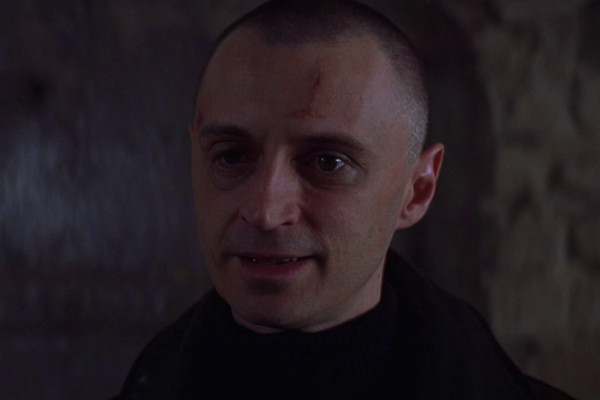
The second post-Austin Powers Bond movie, something the producers admitted was a concern, and placed limits on what was possible in 007 movies. It's also the first movie with a scar above Brosnan's right lip, something caused by an accident on Tomorrow Never Dies, and covered there with careful angles.
As with Christoph Waltz, Robert Carlyle is slightly disappointing as Renard. Outstandingly threatening in Trainspotting, where his "small man with no compunctions about violence" was only too believable, in a James Bond world a slight man who doesn't even reach 5'7 is far less of a viable threat. The fact that Renard's gimmick is that he's impervious to pain isn't really much of a selling point, because while he might not be able to feel pain, that still doesn't mean that physical damage can't be inflicted upon him. He can say "'tis but a scratch" all he likes, he's still incapacitated. (Speaking of Monty Python, then this one sees Desmond Llewellyn hand over as Q to John Cleese. The comic arsenal of Cleese is, like most humour, subjective, and there are certainly plenty of people who think that "angry tall posh bloke shouts at a Spaniard" is the peak of comic achievement. But his cartoonish routine in this movie is one of the lowest points in the whole of James Bond.)
Yet while Renard is said to have extra strength via his brain injury, the fight scenes with Brosnan never really catch fire, or look convincing in any way. Perhaps after getting his real-life scar in the last movie, Pierce decided to take things easier, and make the Bond scraps more of an Eastenderish "did they even connect?" battle. But this isn't quite the point, as Renard isn't supposed to be a full-out formidable villain, but a broken, vulnerable man, as much a victim as anyone else. It's an interesting take, and despite its flaws, The World Is Not Enough is by far the most palatable of the Brosnan Bonds.
Possibly it's because, while Bruce Feirstein (co-writer of Goldeneye and writer of Tomorrow Never Dies) is still on board, he's joined by the writing team that delivered all of Daniel Craig's movies. Consequently, while the dialogue perhaps doesn't shine, there are moments where you can be forgiven for thinking it's actual people talking, rather than actors delivering lines.
Yes, there are some issues with dodgy accents, miscasting, the usual Brosnan excesses with ropey CGI/running from explosions, and extreme suspension of disbelief is required for many scenes. And, with "welcome to my nuclear family", the Bond series may have its worst-ever line. But at the heart of this one is a decent enough plot with enough twists and turns to keep you engaged, even if it does threaten to derail at any moment.
It's perhaps overrated here, a fortunate victim of watching the films in sequence. Following two of the most atrocious films in the canon, what is perhaps just a mediocre Bond entry suddenly feels elevated by virtue of not being one of the other Brosnan films.
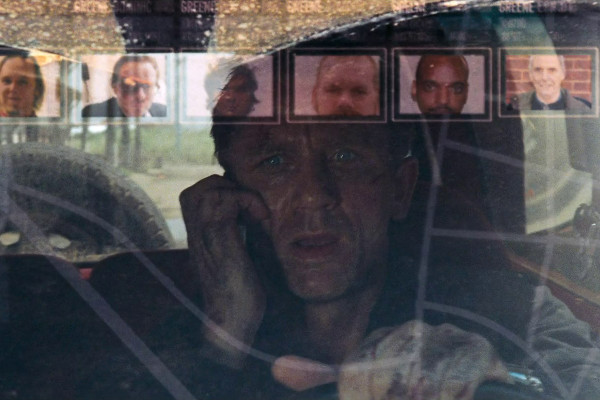
One plus and minus of the Daniel Craig era is that the films have a far greater continuity with each other than any of the other previous films in the series. This does give the franchise chance to develop the characters more, and also allows the audience to get more invested, rather than movies you can watch in isolation and can therefore be felt to be more "disposable".
On the negative side, it does require more of the audience. Characters had passed through the films of the previous Bonds, and there were certain cornerstones you had to remember, like Bond's murdered wife still being referenced in 1989. But Quantum of Solace takes up almost immediately where Casino Royale left off, despite taking almost exactly two years to get to the screen. So it is that an audience gauged on spoon-feeding and throwaway entertainment are suddenly called upon to remember events from 23 mortgage payments and multiple grocery shops later. Really, it's a Bond movie for the boxset generation, rather than a popcorn event for those wanting throwaway entertainment every couple of years.
Gemma Arterton gets a role as one of the Bond girls this time, with her post-coitus line of "Do you know how angry I am at myself?" taking on retroactive irony. In December 2020 Arterton expressed regrets at being in the film, telling The Sun newspaper: "[...] as I got older I realised there was so much wrong with Bond women. Strawberry should have just said no, really, and worn flat shoes." Arterton's role is paper thin, yet her much-slated character name - Strawberry Fields - only appears in the end credits, not in the narrative itself.
Affected by a writer's strike during production, Quantum of Solace certainly doesn't capitalise on, or even consolidate, the promise shown by Casino Royale. Yet this more low-key, inward-looking Bond has somehow acquired a reputation as one of the lesser entries, despite still being perfectly serviceable entertainment. So closely linked to Casino Royale in terms of plot, it doesn't really feel like it has its own identity, but does offer more understated thrills to go with the excess.
Yet some reviewers exaggerate its weaknesses, even listing it as among the very worst Bond films of all, as if getting a slightly underwhelming Daniel Craig entry has made them forget Bond surfing on a 2D iceberg, or Roger Moore kicking a man in the balls while wearing clown shoes. This might be the only Bond film to have incidental music performed on pan pipes, and it acts as more of an epilogue than a film in its own right, but it still remains curiously overlooked.
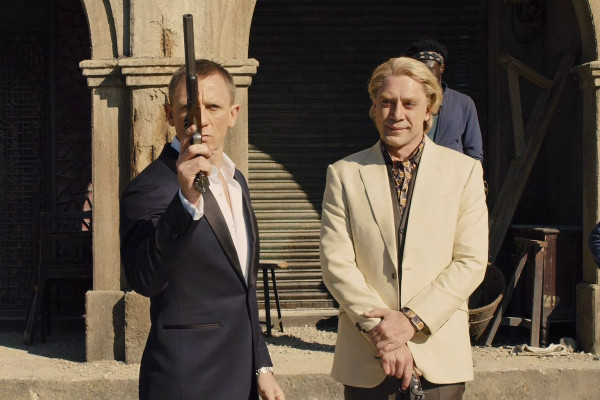
Skyfall - or Skyfaw as Adele fans know it - is a very entertaining James Bond movie built around a somewhat ludicrous premise. Javier Bardem's terrific villain "Silva" is a former agent who was sold out by M and wants revenge, so he constructs an elaborate plan to get back at her, and make her vulnerable to be killed. Said plan involves high level computer hacking and being deliberately captured so he can escape, yet if he wanted to kill M, surely it would have been easier to have just broken into her flat and shot her dead? Okay, this misses out Silva's psychosis and need for the games, but the reality is, if he did that, the film would be over in twenty minutes.
If such things are put aside, then there's a lot to enjoy here, even if Bond's ability to outrun explosions makes another appearance, and some of the background extras and bit part actors deliver shocking performances. The issue with a far-fetched Bond movie in this era is that, because the Daniel Craig films are much more "grounded" and have Bond as an actual acting role, rather than a somewhat two-dimensional archetype, then the more outlandish concepts are placed under greater scrutiny.
There's good and bad throughout. The CGI to augment some scenes has already dated incredibly badly in just 9 years, though Ben Whishaw makes a welcome debut as the new Q. While some of the dialogue can be more than a little "meta", it takes what was a one-joke part under Desmond Llellewyn (and a no-joke part under John Cleese) and does something a little new with it.
The screen can strain under M using the f-word (something that again happens in No Time To Die) and some of the higher violence and more overt sexual activity. The first film to ever be awarded a 12 certificate by the BBFC was the more arthouse Madame Sousatzka in 1989, but it became far more well-known when the newly established rating was given to Batman that same year. It's a classification that has always carried the suggestion that it's there to help box office revenue rather than protect young eyes, and so a parade of "should really be 15" movies go out to kids for financial reasons. It's worked in the past, and clearly worked here, the first Bond film to break a billion, and, even taking inflation into account, still outperformed every other Bond film in history, including Thunderball and Goldfinger, the next two in line.
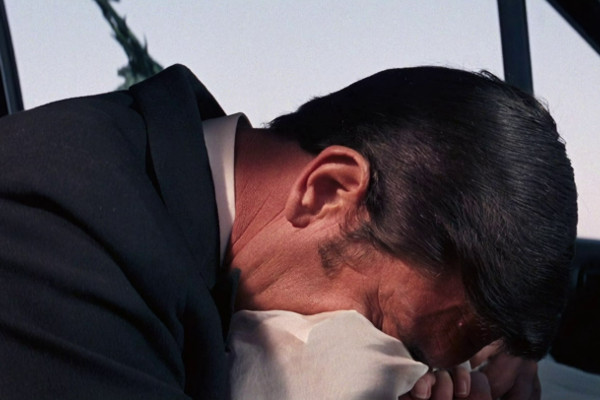
It's difficult to really get a grip on OHMSS, as its standing has been retroactively increased. At the time it had mixed reviews, but to many Bond purists, it's become one of the, if not the best Bond film. One of the main reasons is that it gives a more humanistic, fallible edge and more character to Bond. It's a little odd, considering James was such a two-dimensional character during this period - it's a bit like saying your favourite episode of The Sooty Show is the one where Sweep gets addicted to heroin and Soo goes on the game... which, to be fair, does sound like a pretty good episode of Sooty. (Okay, I lied.)
Another of the reasons is that it's one of the more faithful to Ian Fleming's books. A decision was made early into these reviews not to look at the novels, as this is a review of the film series. They aren't strict "adaptations", and the novels aren't, at least in terms of key information, "source texts". The films are essentially their own thing, and regarded here as such. So ranking the films based on which of them most adhered to a novel is not the point.
Perhaps one of the reasons why OHMSS improves with age is also that it rewards repeat viewings. The return to more of an investigative spy plot is refreshing, and Lazenby doing virtually all of his own stunts shows. While his Bond has more emotion, he's also genuinely physical, as opposed to the Connery version who('s stunt double) is shown to be consistently terrible in a scrap.
The film doesn't hang together completely. Blofield's plan to gas the world using an army of hypnotised "dolly birds" is ropey stuff, and it's hard to get seriously invested in Bond's romance when their courtship is composed of a catchy song and a montage. But while occasionally wooden, Lazenby actually does pretty well considering he'd never acted before. The idea that someone could go to an audition and blag their way into the role of James Bond with zero acting experience outside adverts is a bizarre one, and oddly fitting.
By his own account, Lazenby could be conceited, and was something of a serial shagger on the set, making his exploits as Bond tamer than the real thing. Also new is Telly Savalas, and while he carries the greater physicality needed for this version of Blofeld, it's odd to see the character suddenly turn American. In fact, Savalas, great as he is, is arguably more jarring a replacement for a lead character than Lazenby.
There is the hand of the writer in events, and any secret agent with genuine intentions would have checked to see if Blofeld was really dead at the end. But the ending, as unlikely as it may be, is a strong one, and the opening is terrific. What goes in the middle, however questionable, is pretty good too. Though it's best not to dwell on the main, and huge, plot hole right in the centre of this movie - although played by two different actors, Bond and Blofeld are supposed to be the exact same men who previously met in You Only Live Twice... yet Bond is able to successfully disguise himself from Blofeld by just putting on a pair of glasses.
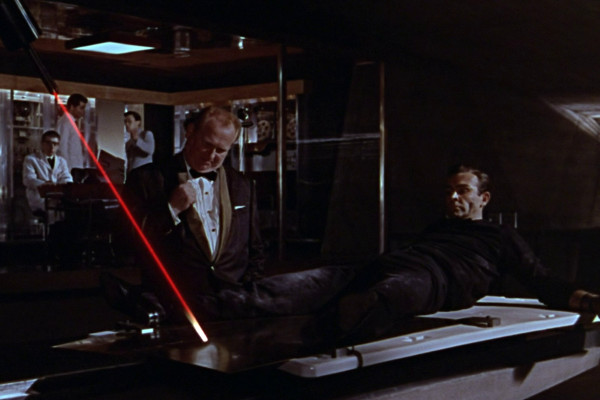
It's easy to resent Goldfinger. Not for its own content, but for the way it cast an enormous shadow over the rest of the franchise, and continues to do so to this day. While the first two films were espionage movies, to a point, here we reach the era of gadgets, eccentric villains and even wilder henchmen, puns and the "big" title song. Even to this day, scarcely a Bond film goes by without a Bassey Xerox on the opening titles, and even though From Russia With Love is on record as being the favourite Bond movie of at least three Bonds, the first two are often seen, retroactively, as "proto-Bond", in deference to this entertaining but silly third movie.
it's not quite true to say that the real silliness and comic bookish instincts of the series begin here, as From Russia With Love also had its own extreme henchmen, but this is really where the Austin Powers connections really start to kick in. Austin Powers was a film series that was never subtle, but then neither was James Bond. Although it was the Connery movies that took most of the amusing and affectionate mockery, the timeline for Austin Powers releases coincided with Pierce Brosnan's reign as the character, whereby the winter release of every one of his last three films had to follow a summer release for an Austin Powers movie that same year.
Even the rebooted Daniel Craig years are in almost constant deference to it: when asked if he wants a drink shaken or stirred, we're told "do I look like I give a damn?" But by saying it, and thereby giving a meta commentary to the audience, it proves that, yes, he very much does, and this new, "gritty" Bond must be established in audience's minds by explicitly contrasting it with films that were already over forty years old. This is the film where "shaken, not stirred" becomes a motif rather than just the way he likes his drink, and "Bond, James Bond" isn't said as playful mockery of someone else's formal introduction, but has already become an unlikely catchphrase.
The Connery era is well-produced, but does betray its age: backscreen projection is quite poor here, and generally all of his films are heavily blighted by obvious post-dubbing for performers with accents considered too "exotic". Although Goldfinger is the largest part to be post-dubbed, it is, in fairness, one of the better efforts, whereas with Dr. No, as good as it is, it seems like half the cast have someone else's voice coming out of their larynx. Yet the fact that the main performers never left Pinewood to finish the film is betrayed by the "American" skyline which, particularly on BluRay, can be nothing but English weather.
While there's rumours about the first two movies, this is the first Bond film where Connery officially had a hairpiece to supplement what was left up top, as well as the only Bond movie where he apparently neglected to have a back wax. Despite all these criticisms, maybe resistance to this film simply comes down to over 50 years of being told it's the Bond film, or having to search for hours for another "worst to best" article (of which there are many) which doesn't contain the phrase "gold standard". Or, indeed, the same screenshot that I felt almost obliged to use here.
Bond in the Connery era has an odd view towards homosexuality: while 1971's Diamonds Are Forever had a henchman who got sexual gratification from having his testicles crushed by Bond, Goldfinger marks the second film in a row to feature a lesbian as a villain. Of course, while the legalisation of homosexuality was still three years in the future, there'd never been a law applied to women in this matter, and so the predatory Rosa Klebb is not-so-subtlety coded in From Russia with Love. In Goldfinger Pussy Galore (Honor Blackman) is turned by having Bond almost force himself on her, something which hasn't aged well at all. Having said this, Pussy's sexuality is more in the pages of Ian Fleming's novel rather than explicit onscreen, so it could be assumed that Bond's forceful coupling is only able to make someone change sides, not sexual preference.